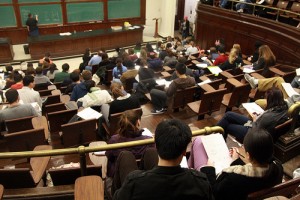Learning Ally College Success Program mentor Joe Retherford shares his thoughts on why blind college students should never be gun-shy when it comes to asking questions.

For me, the hardest thing in college was not the subject matter – it was building up the courage to ask questions. Asking questions sounds easy. We ask so many in our lives, but as the only blind person in my college classes, I hated feeling even more different by calling attention to myself. As much as possible, I avoided being the thorn in my professor’s side. At the beginning of my college career, I did not ask any questions in lectures and never utilized office hours, and consequently, I suffered. I attended lectures that were complete wastes of time and took tests for which I discovered too late that I was not prepared. Over time, I learned to be the pesky student who asked all of the questions and, as a result, my grades were happier.
Asking questions during lectures was challenging because I don’t like interrupting anyone while he or she is talking. In courses with a lecture format, the professor would be rolling along, and I didn’t want to stop the flow. There were as many as 300 students attending the class who didn’t want the professor to stop talking either. However, questions need to be asked, and you need to feel comfortable slowing professors down to make lectures useful and meaningful for you. I would remind myself that I am paying just as much tuition as everyone else in the class, so I deserve the right to ask a question as well. Just because I can’t see the material on the board doesn’t mean that I don’t deserve the right to know what is there. When a professor says, “…this equation over here,” I should have the same right to know the sample equation, so I need to interrupt and ask the question.
When you’re in a large lecture class, make sure to sit close to the front. Projecting your voice from the back of a large room is difficult, and the harder it is to ask questions, the less likely you'll want to ask them. In my undergraduate experience, students often thanked me for asking questions in lectures because it slowed the professor down. The Q&A time gave the other students in class a moment to think about the material longer, so they could better comprehend it. So just remember: you are not annoying the other students – you are helping them.
One under-utilized resource in college is the extra time your professor or teaching assistant sets aside: office hours. Office hours became essential to my success in college. They allowed me to have a more intimate environment with professors than lectures where I could ask a lot of follow-up questions. At first, I was intimidated about going to the professor’s office hours because I didn’t want to seem like I wasn’t paying attention in class. In my experience, though, professors like students who approach them outside of class. I built more genuine connections both with the professors and the material. Some professors may even consider bumping a grade up if it is on the borderline, but they would only do that for students they know are working hard. Professors like seeing students who care about the material. Remember: professors are paid for being there whether students come or not, so don’t feel self-conscious about your questions. You are not wasting their time.
If I could give one piece of advice to any student, it's this: ask as many questions as you need.
 After losing his sight in a hunting accident during his senior year of high school, Joe Retherford made a commitment to himself to live life to the fullest. He has since graduated from UC Davis with a degree in mathematics and plans to pursue a career in teaching. Hear more from Joe on Learning Ally’s College Success Program website as he discusses “Losing Sight, Gaining Purpose.” To learn more about the program, visit www.LearningAlly.org/CollegeSuccess.
After losing his sight in a hunting accident during his senior year of high school, Joe Retherford made a commitment to himself to live life to the fullest. He has since graduated from UC Davis with a degree in mathematics and plans to pursue a career in teaching. Hear more from Joe on Learning Ally’s College Success Program website as he discusses “Losing Sight, Gaining Purpose.” To learn more about the program, visit www.LearningAlly.org/CollegeSuccess.